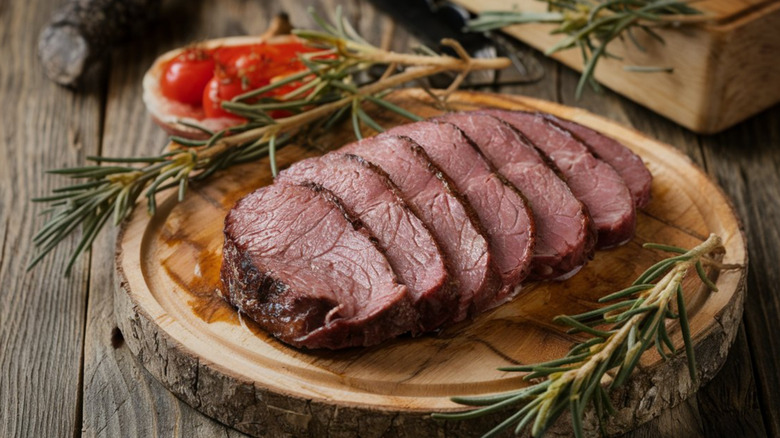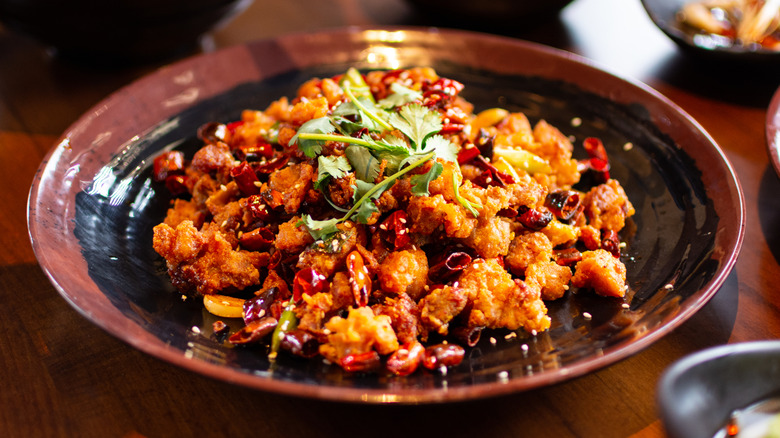Is Overcooking Meat Responsible For That Gamey Flavor?
Gamey is used as a descriptor for boldly flavored meats, and often it's not meant as a compliment. Sam Shafer, executive chef of Revival at The Sawyer in Sacramento, California, took a fairer approach. "A strong, distinctive flavor that is often earthy, musky, or slightly pungent" is how he described gameyness to The Takeout. "This is commonly associated with wild-caught animals and leaner cuts of meat."
Venison, rabbit, bison, lamb, goat, wild boar, and various winged animals (such as squab or pheasant) are known to have a gamey taste. Because they graze freely (rather than subsisting on grains) and exercise significantly more, the meat has much less fat than domesticated animals. As such, it simply has a stronger taste than what some people are used to.
That robust flavor –- which fans of wild game associate with savory umami — is pleasant when prepared correctly, but it can also become overwhelming. Shafer explained that overcooking can be a reason these types of proteins taste overly gamey. "Overcooking meat can cause it to become dry and tough," he explained. "When meat loses its moisture, the concentrated flavor can become more pronounced, including the gamey taste. Overcooking can break down the fat excessively, leading to a stronger, more intense taste."
Quickly searing or grilling, or (conversely) low-and-slow braising or roasting, are the best cooking methods for ensuring moisture retention — but it depends on the type of meat. Think chargrilled, spatchcocked quail or venison mole coffee chili. "You can incorporate fats like butter, olive oil, or bacon to add richness and balance the flavors," Shafer suggested.
Flavors to pair with wild game
Aside from avoiding overcooking, there are many other ways to make sure game meats are bold and delicious without veering into gamey territory. Because these proteins do have a strong flavor, they can stand up to ingredients with similarly intense profiles. "[Use] robust spices to enhance the natural flavors or incorporate strong herbs to mask the gamey notes," Shafer told The Takeout.
Take Palestinian quidreh, for example. These slow-simmered lamb shanks are flavored with allspice, bay leaves, cinnamon, coriander, turmeric, black pepper, and cumin before being served with rice infused with similar spices as well as lots of garlic and onion. Cumin lamb from Xinjiang, China is another great example of how to treat potentially gamey meats. Instead of an hours-long cook, sliced lamb which has been marinated in a mixture of soy sauce, cornstarch, and Shaoxing wine is quickly stir-fried in a screaming hot wok. Lots of cumin, Sichuan peppercorns, red chili peppers, fresh cilantro, and scallions flavor the dish.
Sugar is also your friend when it comes to flavor pairings for wild game. "You can pair gamey meats with sweet ingredients like fruity sauces or caramelized onions to create a balanced flavor profile," Shafer explained. Consider pheasant roasted with apples, thyme, and sage for a holiday meal or grilled quail brushed with a two-ingredient balsamic glaze. You can also serve wild game with sweet side dishes such as sweet and savory grilled fruit, a hearty kale salad with pomegranate arils and a honey-Dijon vinaigrette, or glazed roasted vegetables.

